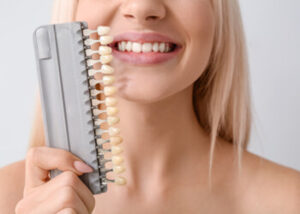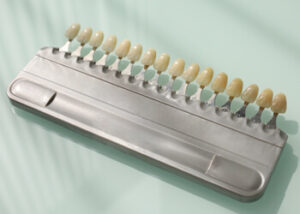Dental veneers are thin tooth-coloured shells that cover the surface of your teeth. They are bonded to the tooth to change its shape, colour, size, or length. Dental veneers are personalised to fit your teeth’s unique size and shape. They look natural while still accentuating the features you want to enhance.
Dental veneers allow you to change your teeth’s appearance without permanently altering your tooth structure. They last an average of 10 years but may need to be replaced sooner or later, depending on how well you take care of them. This article will shed some light on dental veneers and why they may be beneficial for you.
Types of Dental Veneers
There are three main types of veneer materials, each with its own set of advantages and disadvantages:
1. Porcelain Veneers
Porcelain veneers are a popular choice among patients who want to make small changes to the shape, size, and colour of their teeth.
 Porcelain veneers are thinner than other types of veneers, so they give you a more natural appearance.
Porcelain veneers are thinner than other types of veneers, so they give you a more natural appearance.
They can last up to 10-12 years with good care.
Though they look natural and are durable, porcelain veneers come with a higher price tag.
Also, if they break, there is no fix – you’ll need an entirely new one.
2. Ceramic Veneers
Many people choose ceramic veneers because they look natural and are durable. They can also mimic your real teeth. Just keep in mind that they may take longer to create than other types of veneers, and you might experience tooth sensitivity for a short time after the treatment.
3. Composite Veneers
Some patients choose composite veneers because they are less expensive than other types of veneers. They also don’t require as much tooth preparation. However, it’s important to remember that composite veneers have a shorter lifespan and are more likely to discolour, break, or chip.
Benefits of dental veneers
1. Dental veneers can fix cracked and chipped teeth
If you have fractured teeth, gaps between your teeth or any other cosmetic issue that affects your confidence when you smile, dental veneers may be the right solution for you. A consultation with your cosmetic dentist will help determine if veneers are the best option to achieve the results you desire.
In case your tooth is fragile, your dentist may instead advise placing a dental crown to fully restore the tooth’s strength and original appearance. No matter what route you and your dentist decide to take, he or she will ensure that your smile looks natural and healthy again.
2. Dental veneers give a natural look
People will never be able to guess that you’ve had a dental cosmetic procedure done if you don’t tell them. Dental veneers, especially porcelain veneers, look natural and feel even more so in your mouth since they are custom-made to fit your teeth specifically.
3. Dental veneers only require a small amount of enamel to be removed
Removing only a thin layer is all that’s necessary when getting veneers. If you don’t remove any enamel, the tooth will look bulky and uneven once the veneer is bonded.
Porcelain veneers are only bonded to the front of your teeth, as opposed to dental crowns and bridges, which have to fit over a tooth or multiple teeth. This means that less enamel would have to be removed for a veneer than for a crown.
4. They prevent discolouration
If you take care of your teeth and eat the right foods, your veneers should last for many years.
Dental veneers will mostly come in contact with the food and beverages you consume, offering a protective layer for your natural teeth and preventing discolouration.
5. Maintaining dental veneers is easy
Dental veneers are cavity-resistant, which means you won’t have to put in much work to maintain them!
Porcelain veneers don’t stain easily, but you should still brush your teeth twice daily and floss once to maintain good oral health. Book regular dental appointments to help sustain the veneer’s whiteness and to have a beautiful, healthy smile.
6 tips to take care of your dental veneers
1. Follow proper oral hygiene
You can maintain your current dental hygiene routine to care for your veneers. You just need to brush, floss, and rinse as usual.
Make sure to brush your teeth at least twice a day using nonabrasive toothpaste. You can use either a manual or electric toothbrush, depending on what you prefer. Flossing ensures the removal of particles caught between the teeth and protects the health of your teeth, veneers, and gums too.
Incorporate antiseptic mouthwash into your daily routine by rinsing your mouth with it once or twice a day. Its alcohol content will keep the bonding agent that affixes the veneers to your teeth strong, preventing deterioration and staining.
2. Avoid grinding and clenching
Bruxism, or the grinding and clenching of teeth during sleep, is exceptionally stressful for veneers and can cause damage to both your natural teeth and jaw joints. If you think you may suffer from bruxism, see your dentist as soon as possible– they can help fit you with a nighttime bite guard that will protect your new veneers while you sleep.
3. Chew carefully
Veneers are durable but can still chip and break if you’re not careful. To avoid damage, stick to eating soft foods and steer clear of hard materials like pencils, fingernails, ice cubes, and bones.
4. Protect your smile
To avoid any damage to your veneers or natural teeth, invest in a mouth guard if you participate in contact sports such as basketball, football, or wrestling. Other than protecting your smile, physical activity is important for a healthy lifestyle.
 5. Be careful about staining
5. Be careful about staining
Just as your natural tooth enamel can be stained from different foods and drinks, so too can veneers. It’s best to limit the consumption of items known to cause discolouration, such as coffee, red wine, dark sodas, tea, soy sauce, and berries. Additionally, smoking cigarettes is another common culprit of stains. If you currently smoke tobacco products, it may be advantageous to quit not just for improved oral health but also for brighter veneer colour.
6. Regular dental checkups
According to dental professionals, people should get routine dental checkups every six months. By seeing your dentist frequently, you’re more likely to catch small problems early on and prevent them from turning into bigger issues. Furthermore, regular cleanings by a dental hygienist will help keep your veneers bright and polished.
Are you ready to receive your dental veneers?
Book an appointment with Beyond Infinity Dental or call us on (02) 8806 3799 and take a professional opinion on dental veneers.
Note: Any surgical or invasive procedure carries risks. Before proceeding, you should seek a second opinion from an appropriately qualified health practitioner.
References
How long can you expect veneers to last?
https://www.healthline.com/health/how-long-do-veneers-last
Dental Veneers
https://www.webmd.com/oral-health/guide/veneers#1









